Serving 12 students in grades Kindergarten-12, Hallmark Charter ranks in the top 50% of all schools in California for overall test scores (math proficiency is top 50%, and reading proficiency is top 50%).
The percentage of students achieving proficiency in math was 30-34% (which was approximately equal to the California state average of 33%). The percentage of students achieving proficiency in reading/language arts was 60-64% (which was higher than the California state average of 47%).
The student:teacher ratio of 12:1 was lower than the California state level of 21:1.
Minority enrollment was 75% of the student body (majority Hispanic), which was lower than the California state average of 80% (majority Hispanic).
Top Rankings
Hallmark Charter ranks among the top 20% of public schools in California for:
Category
Attribute
Community Size
Student Attention
School Overview
School Type
Grades Offered
Grades Kindergarten-12
Total Students
12 students
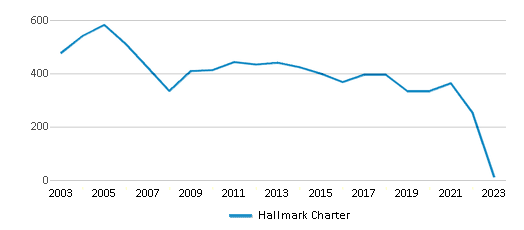
Gender %
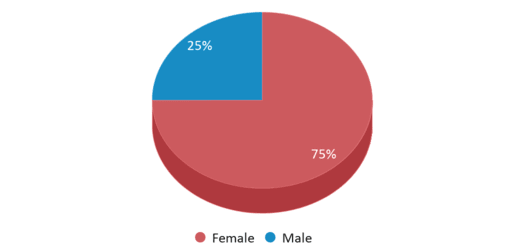
Total Classroom Teachers
1 teacher
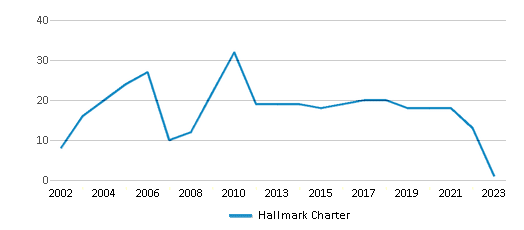
Students by Grade
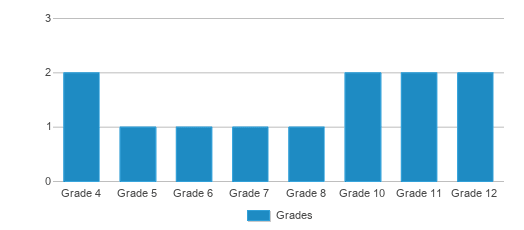
School Calendar
School Rankings
Overall Testing Rank
#3014 out of 9602 schools
(Top 50%)
(Top 50%)
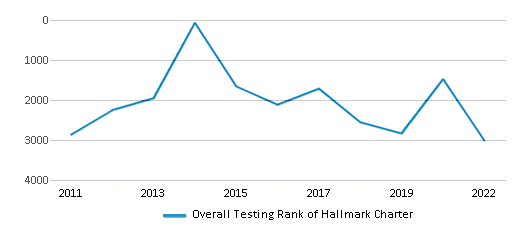
Math Test Scores (% Proficient)
30-34%
33%
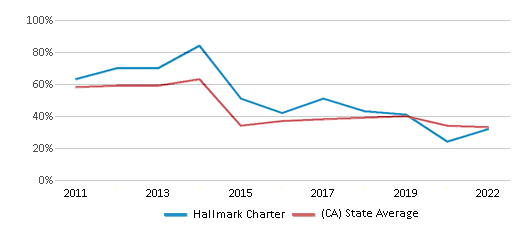
Reading/Language Arts Test Scores (% Proficient)
60-64%
47%
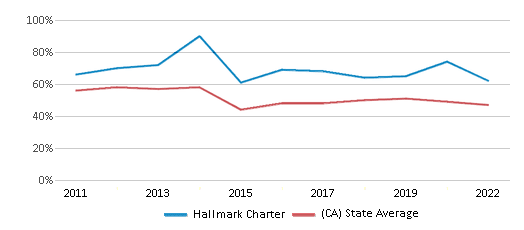
Science Test Scores (% Proficient)
30-34%
29%
Student : Teacher Ratio
12:1
21:1
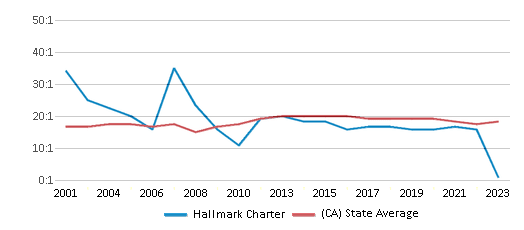
American Indian
n/a
1%
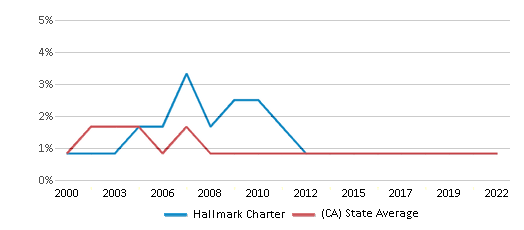
Asian
n/a
12%
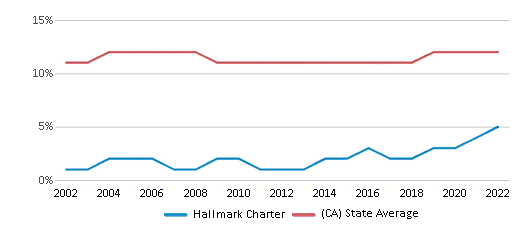
Hispanic
50%
56%
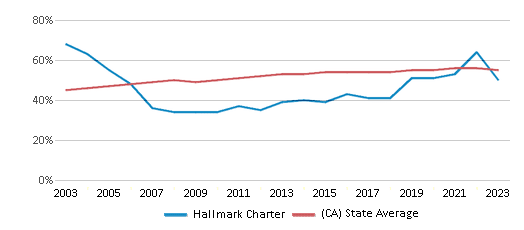
Black
n/a
5%
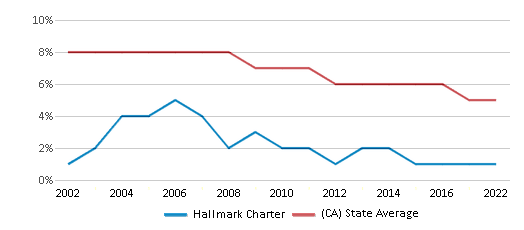
White
25%
20%
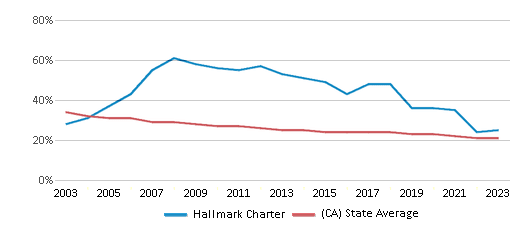
Hawaiian
n/a
n/a
Two or more races
25%
6%
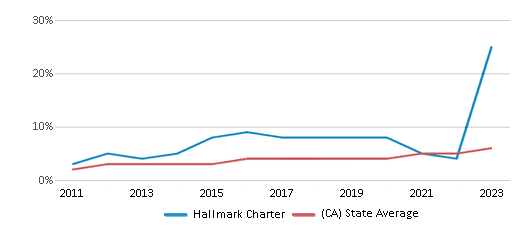
All Ethnic Groups
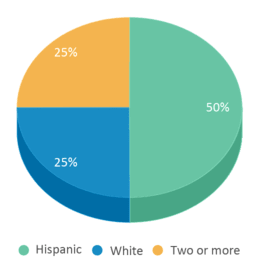
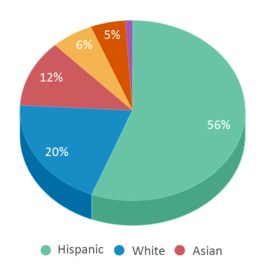
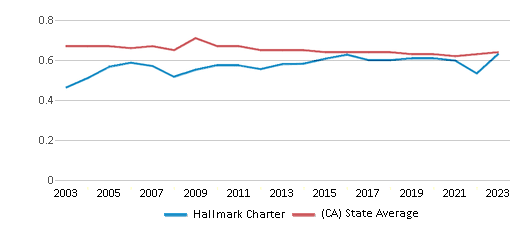
Graduation Rate
≥90%
87%
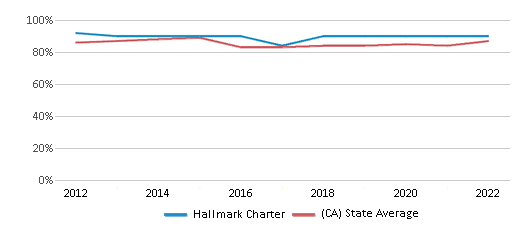
Eligible for Free Lunch
17%
54%
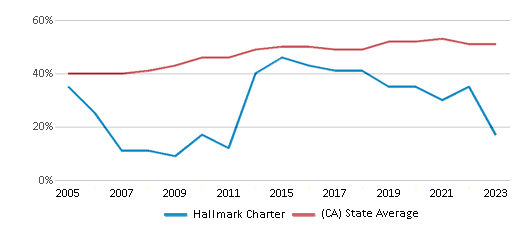
Eligible for Reduced Lunch
17%
8%
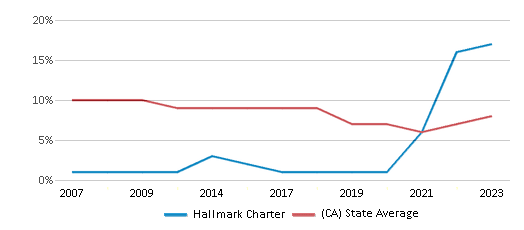
School Statewide Testing
School District Name
Source: National Center for Education Statistics (NCES), CA Dept. of Education
Frequently Asked Questions
What is Hallmark Charter's ranking?
Hallmark Charter is ranked #3014 out of 9,602 schools, which ranks it among the top 50% of public schools in California.
What percent of students have achieved state testing proficiency in math and reading?
30-34% of students have achieved math proficiency (compared to the 33% CA state average), while 60-64% of students have achieved reading proficiency (compared to the 47% CA state average).
What is the graduation rate of Hallmark Charter?
The graduation rate of Hallmark Charter is 90%, which is higher than the California state average of 87%.
How many students attend Hallmark Charter?
12 students attend Hallmark Charter.
What is the racial composition of the student body?
50% of Hallmark Charter students are Hispanic, 25% of students are White, and 25% of students are Two or more races.
What is the student:teacher ratio of Hallmark Charter?
Hallmark Charter has a student ration of 12:1, which is lower than the California state average of 21:1.
What grades does Hallmark Charter offer ?
Hallmark Charter offers enrollment in grades Kindergarten-12
What school district is Hallmark Charter part of?
Hallmark Charter is part of Sanger Unified School District.
Recent Articles

Sexual Harassment at Age 6: The Tale of a First Grade Suspension
A six-year old in Aurora, Colorado, was suspended after singing an LMFAO song to a little girl in his class and reportedly “shaking his booty.” We look at the case and the sexual harassment problem in public schools today.

How Scaffolding Could Change the Way Your Child Learns
This article explores the concept of instructional scaffolding, a teaching method that enhances learning by breaking down complex tasks into manageable parts. It highlights how scaffolding supports students in developing critical thinking skills and becoming more independent learners. The article discusses the benefits of scaffolding, including improved engagement and reduced anxiety, and provides strategies for its implementation across various educational levels.

February 05, 2025
Understanding the U.S. Department of Education: Structure, Impact, and EvolutionWe explore how the Department of Education shapes American education, from its cabinet-level leadership to its impact on millions of students, written for general audiences seeking clarity on this vital institution.





